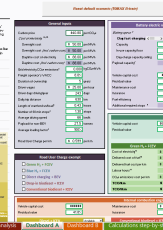Project overview
Aim of the project
To provide a tool to help long-distance heavy freight companies and the public sector understand fleet decarbonising options.
- Status
Next steps
Partners to do several demonstration case studies.

Long-distance heavy freight total cost of ownership (LDHF TCO) comparison tool
View or download the Tool (available as a Microsoft Excel document) and the user guide (available as a PDF file).
Please note that the tool includes cost information which are assumptions only regarding to prices. These are for illustrative purposes only and you will need to input up-to-date costs, such as the price of electricity and the price of diesel.
For the diesel/hydrogen blended fuel option, the costs are only assumptions for illustrative purposes and may not reflect actual costs. The actual costs will be included once hydrogen is available for sale and the conversion kit has been priced accurately.
If you wish to receive an updated version of the tool with updated costs imbedded, please register your contact details below.

This work is licensed under a Creative Commons Attribution-ShareAlike 4.0 International License
Following on from the review of existing studies into the economics of decarbonising long-distance heavy freight (LDHF) in New Zealand, Ara Ake has launched a free tool to help LDHF companies and the public sector better understand the options for decarbonising their road fleet.
The tool takes a ‘total cost of ownership’ (TCO) approach to calculating the cost of road freight movements. This means rather than just looking at the upfront cost of buying different types of vehicles, it estimates the relative costs of using different vehicles powered by different fuels for a given freight trip. It is intended to be a flexible tool for interested parties to determine what needs to be true for a vehicle and fuel combination to be the lowest-cost option.
The TCO comparison tool looks at trips carried out by vehicles powered by green hydrogen, battery electric vehicles, drop-in and conventional biodiesels, standard diesel internal combustion engine vehicles, and the most recently added diesel/hydrogen blended fuel.
The tool comes with a set of inbuilt assumptions about various factors, such as the cost of electricity, vehicle capital costs, the cost of various fuels, and road user charges. It also incorporates typical data on average daily heavy freight trips provided by EROAD, including information on average daily kilometres travelled, average number and length of stops, and average speed. However, users are free to run and save their own scenarios and input their own data. It allows users to run their own scenarios and input their own data, enabling it to incorporate commercially sensitive data not yet in the public domain.
The tool was developed for Ara Ake by NERA Economic Consulting, peer reviewed by the New Zealand Institute of Economic Research, and includes freight data provided by EROAD.
Ara Ake hopes this will be a useful resource for public and private sector decision-makers when they are making strategic decisions about transport investments. By making their scenarios fully customisable, users can also make decisions based on what they know and expect to be true, such as price paths for carbon over time.